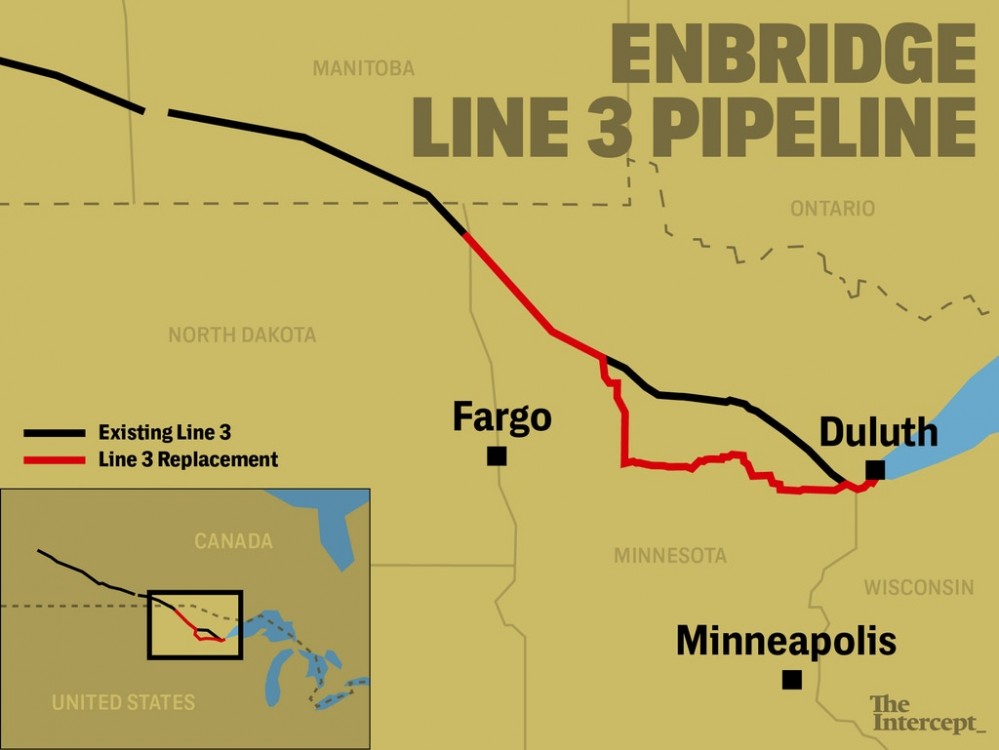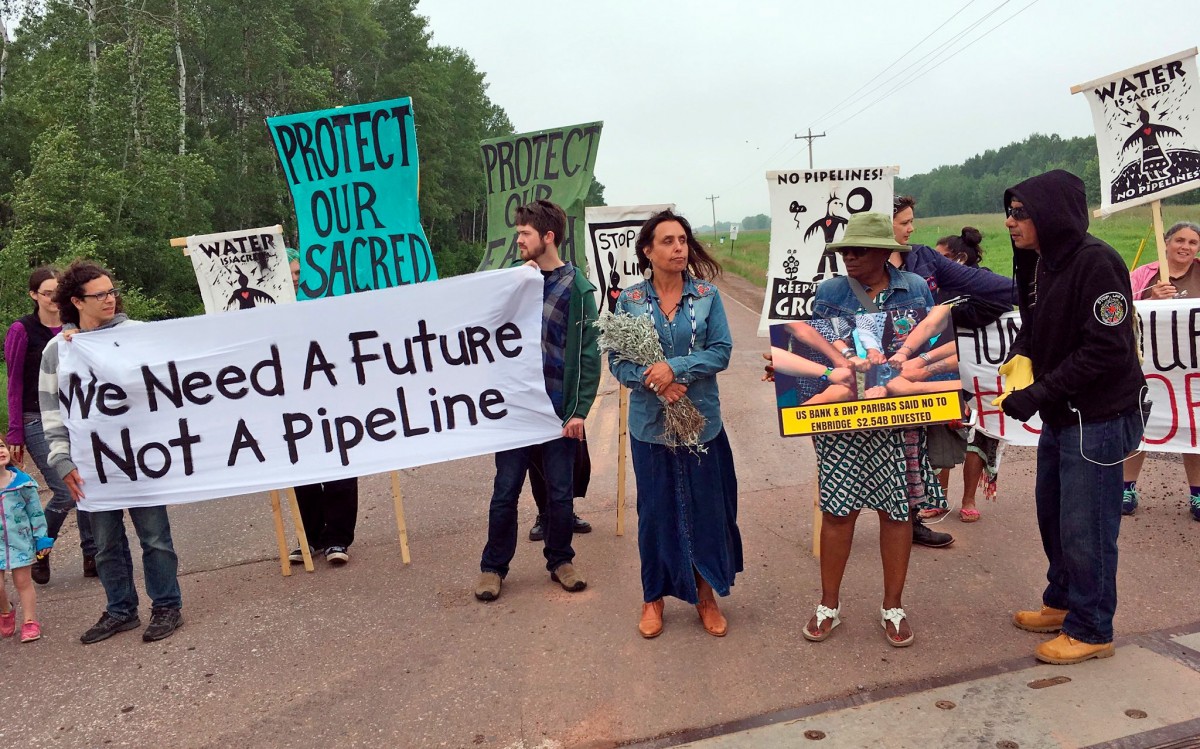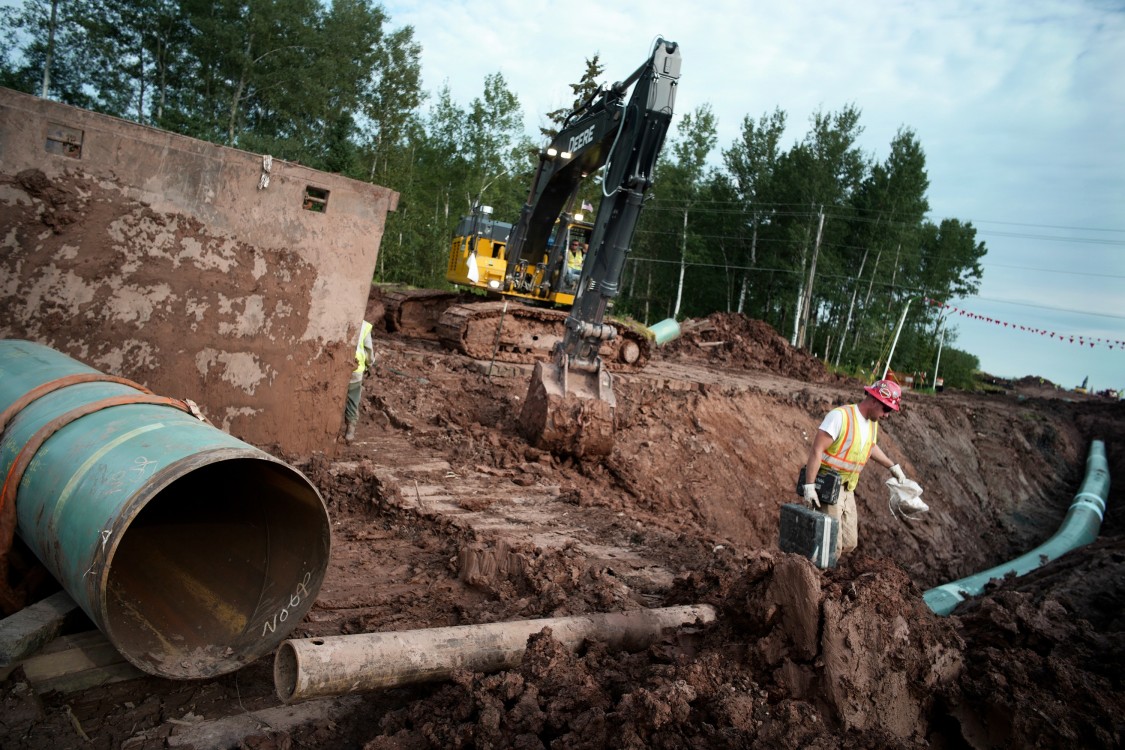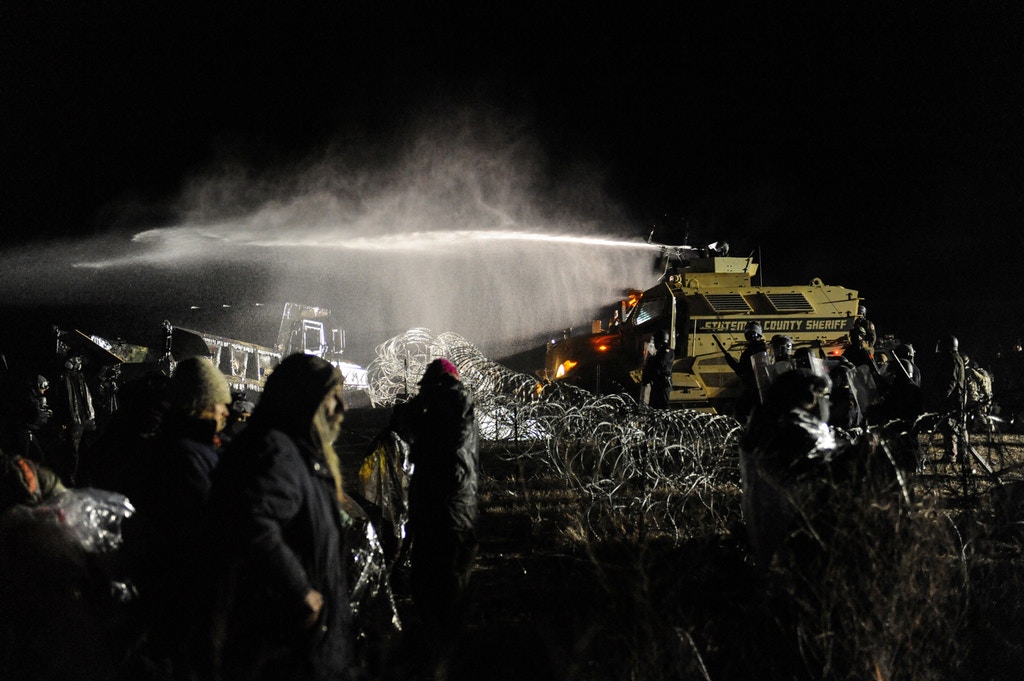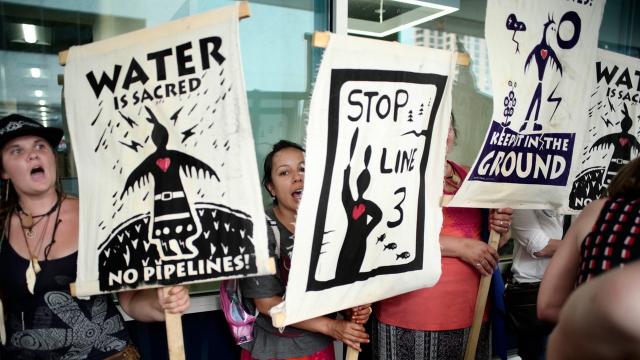
Activists protest the approval of Enbridge’s proposal to replace its aging Line 3 pipeline on June 28, 2018, in St. Paul, Minn. Photo: Richard Tsong-Taatarii/Star Tribune/AP
Minnesota police have spent 18 months preparing for a major standoff over Enbridge Line 3, a tar sands oil pipeline that has yet to receive the green light to build in the state. Records obtained by The Intercept show that law enforcement has engaged in a coordinated effort to identify potential anti-pipeline camps and monitor individual protesters, repeatedly turning for guidance to the North Dakota officials responsible for the militarized response at Standing Rock in 2016.
Enbridge, a Canada-based energy company that claims to own the world’s longest fossil fuel transportation network, has labeled Line 3 the largest project in its history. If completed, it would replace 1,031 miles of a corroded existing pipeline that spans from Alberta’s tar sands region to refineries and a major shipping terminal in Wisconsin, expanding the pipeline’s capacity by hundreds of thousands of barrels per day.
The expanded Line 3 would pass through the territories of several Ojibwe bands in northern Minnesota, home to sensitive wild rice lakes central to the Native communities’ spiritual and physical sustenance. Given that tar sands are among the world’s most carbon-intensive fuel sources, Line 3 opponents underline that the pipeline is exactly the kind of infrastructure that must be rapidly phased out to meet scientists’ prescriptions for mitigating climate disasters.
The Line 3 documents, which were obtained via freedom of information requests, illustrate law enforcement’s anxiety that pipeline opponents could galvanize support on a scale similar to the Dakota Access pipeline struggle, which drew thousands of protesters to the Standing Rock Sioux reservation in southern North Dakota.
A police response like the one in North Dakota is a significant concern for Line 3 opponents. At Standing Rock, law enforcement used water cannons, rubber bullets, armored personnel carriers, and sound cannons in an operation that resulted in serious injuries. Aided by private intelligence and security firms working for the pipeline, they gathered information on protesters via aerial surveillance, online monitoring, embedded informants, and eavesdropping on radio signals. In a time of growing resistance to fossil fuel industries, the public-private partnership served as a chilling example of law enforcement agencies acting as bulwarks of the oil industry.
In 2017, Enbridge began construction on the tiny portion of Line 3 that cuts into Wisconsin. Local police reports describe two security firms, Raven Executive and Security Services and Securitas, keeping tabs on protesters and reporting their activities to law enforcement. It was the protests in Wisconsin that sparked the multistate coordination led by Minnesota. The state’s fusion center developed a reputation as “the keepers of information for the Enbridge protests,” as one sheriff’s analyst put it, receiving information on Line 3 opponents from police departments in at least three states. While fusion centers were originally established to facilitate counterterrorism intelligence-sharing, they have increasingly played a role in monitoring, interpreting, and criminalizing political activity.
Meanwhile, opposition research firms that market their services to energy companies have also singled out Line 3 as the next likely flashpoint of opposition to a U.S. pipeline project. Executives of the public relations firm Off the Record Strategies and the private intelligence firm Delve, which the National Sheriffs’ Association contracted in 2016 to dig up information on DAPL opponents, gave an overview of their work at a pipeline industry conference in 2017. “If you look at Line 3, they’re already arresting activists in Minneapolis. They’re already doing encampments in Wisconsin,” Delve CEO Jeff Berkowitz told conference attendees, according to audio obtained by The Intercept. “I think the next one is potentially going to be worse than DAPL.”
Tribal attorney Tara Houska, who is Ojibwe from the Couchiching First Nation and the national campaigns director for Honor the Earth, has been deeply involved in organizing against Line 3.
“It’s clear that Enbridge is doing everything they can to have a very highly skilled force of security and law enforcement at their fingertips to do what they can to stop any resistance to Line 3,” said Houska, who also took part in the struggle at Standing Rock. “And if anything, it seems like what they’re doing is much more coordinated than what we saw in North Dakota.”
Tipping off law enforcement
As Line 3 construction got underway in Wisconsin, protesters stalled the pipeline’s progress by locking themselves to equipment and using disabled cars to erect a blockade. Between August and September 2017, police arrested at least 13 people. Incident reports turned over by the Douglas County Sheriff’s Office show that during this time, Enbridge security guards routinely contacted sheriff’s deputies to report the activities of pipeline opponents.
In July, a security guard whose LinkedIn page indicated that he worked for Raven Executive and Security Services informed a sheriff’s deputy that his company “monitors the online activities of the pipeline protesters.” Another security officer reported that the company’s excavators had mysteriously been moved, then used his audience with the sheriff’s office to mention a vague tip about Winona LaDuke, the Ojibwe former vice-presidential candidate and a staunch Line 3 opponent. LaDuke had been seen in the area recently, the security officer said, and her “boyfriend” had been heard stating that he wanted to “do something to the pipeline.”
Throughout August, Neo Gabo Benais, who is from Ojibwe country, posted the coordinates of Line 3 construction sites on social media and shared photos and videos taken from inside the sites. The same month, an Enbridge security guard reported to the sheriff’s office that he had “posted threatening messages on Facebook.” Another caller identified as a Securitas employee said he had been seen “driving slowly around the pipeline 3.”
Neo Gabo Benais told The Intercept that in 2002, an Enbridge pipeline ruptured near where he lived and fished in Minnesota, spilling 252,000 gallons of crude into a marsh. “I’m just trying to spend their money up,” he said. “It’s really a waste of time, them surveilling me.”
According to its website, Raven is “owned and operated by current and former law enforcement professionals.” In 2015, the company launched Raven Executive Unmanned Aerial Vehicle services. A filing with Federal Aviation Administration indicates that Raven intended to utilize its drones to inspect “energy pipelines.”
Securitas is an enormous, publicly traded corporation with operations in over 50 countries. It owns the nation’s oldest private security company, Pinkerton, which became notorious for its union-breaking activities and infiltration of leftist organizations at the turn of the 20th century.
Neither Raven nor Securitas responded to requests for comment. Enbridge did not respond to requests for comment.
“The keepers of information”
In September 2017, the Wisconsin Statewide Intelligence Center emailed information about recent arrestees to the fusion centers in their home states of Minnesota, South Dakota, Michigan, Missouri, Illinois, and Indiana.
The next month, an analyst from the Minnesota Fusion Center pledged to ensure that law enforcement in disparate counties would be “well-informed of any potential hazards relating to the Line 3 project.” In an email sent to the fusion center, a crime analyst from Minnesota’s Beltrami County noted, “There is concern about Winona LaDuke.” The analyst listed four properties that LaDuke was suspected of owning and speculated about which might be used to put up protesters.
Another email sent to the fusion center noted that Jackie Fielder, a San Francisco-based organizer with the fossil fuel divestment organization Mazaska Talks, had arrived at one of the protest camps in Minnesota. The report speculated not on criminal activity but on whether her presence could signal “increased support from Mazaska Talks and its connections.”
“A fusion center has no business keeping track of a nonviolent divestment campaign that aims to promote Indigenous rights,” Fielder told The Intercept.
LaDuke agreed. “I don’t understand why I’m being looked at as a criminal when a corporation is proposing to destroy my water,” she said. “I am not a criminal, I am a water protector.”
By May 2018, the Beltrami County Sheriff’s Office had established a shared web resource concerning Line 3 opposition, to which 19 police officers in eight jurisdictions had access, as well as the fusion center.
“The Minnesota Fusion Center recognizes and values citizens’ constitutionally protected rights to speak, assemble, and demonstrate peacefully,” Drew Evans, superintendent of the Minnesota Bureau of Criminal Apprehension, said in a statement. “Because public demonstrations are sometimes targeted by individuals seeking to commit crimes or promote violence, the fusion center routinely monitors public sources for potential hazards to the people of Minnesota and its critical infrastructure.”
Brendan McQuade, assistant sociology professor at SUNY Cortland and author of a forthcoming book on fusion centers, sees the Minnesota records as part of a more troubling trend. “What the police aren’t mentioning is that people will likely be living lives of terror and privation by the end of the century due to climate change, and it’s these battles right now that will decide whether that happens,” he said. “Instead, they are casting even entirely nonviolent actions as threats to so-called critical infrastructure.”
Putting “a marker down”
As law enforcement and emergency managers tightened their coordination and intelligence-sharing on protesters, they repeatedly turned for guidance to North Dakota officials who had been involved in repressing the Standing Rock fight.
In September 2017, Cody Schulz, then-disaster recovery chief for the North Dakota Department of Emergency Services, gave a quasi-scientific overview of NoDAPL at a Minnesota emergency managers conference. He claimed that at any given time, around 400 protesters at Standing Rock were “willing to commit criminal acts,” while 80 were “willing to commit dangerous or violent acts.” Other slides attempted to justify the use of fire hoses and dogs to quell protests and stressed the need for a robust public relations operation.
In late 2017 and early 2018, members of the Cass County Sheriff’s Office, a major architect of the DAPL police operation, gave three more presentations on lessons learned in North Dakota to law enforcement in Wisconsin and Minnesota, including an association of SWAT officers.
At the Platts Pipeline Expansion and Development Conference in November 2017, Delve CEO Jeff Berkowitz and Off the Record Strategies CEO Mark Pfeifle gave a presentation to pipeline executives on how to prepare should opposition to future infrastructure projects develop the way NoDAPL did.
As part of law enforcement’s counterinformation campaign in response to NoDAPL, Berkowitz said, Delve developed “sort of fake ‘wanted’ posters, with the rap sheets of some of these folks.”
Pfeifle said one of his company’s goals was to deter protesters from becoming involved in the movement to begin with. “A lot of things that we were doing were being done to put a marker down for the protesters. And, ‘OK, if you’re going to go protest somewhere? There’s going to be consequences from it.’”
Prior to their work for the National Sheriffs’ Association, both executives spent years as elite Republican spin doctors. Pfeifle worked as an Iraq War public relations specialist for the George W. Bush administration, while Berkowitz directed the Republican National Committee’s multimillion-dollar opposition research operation.
Neither Delve nor Off the Record Strategies responded to requests for comment.
Worth fighting for
Construction is already complete across most of Line 3’s route, and Enbridge has told shareholders that it intends to have oil flowing by November. But it awaits final approvals in Minnesota from the U.S. Army Corps of Engineers and several permitting agencies. This past June, despite receiving 68,000 comments opposing Line 3, the Minnesota Public Utilities Commission unanimously voted to grant Enbridge a “certificate of need” for the project.
The Minnesota Department of Commerce filed a lawsuit challenging the approval last month — a rare instance of one state agency suing another over a major infrastructure project. Outgoing Gov. Mark Dayton made a statement opposing the project on the grounds that most of the tar sands bitumen would not meet demand in Minnesota but would instead “flow through our state to supply other states and countries.” Gov. Tim Waltz told reporters in January that he was weighing whether to drop the lawsuit.
Resistance to new pipelines has taken a major toll on the tar sands industry. In August, a Canadian judge scuttled federal permits for the Trans Mountain tar sands pipeline expansion, ruling that the federal government had failed to adequately consult with Indigenous nations in the pipeline’s path. In November, responding to a lawsuit by tribal and environmental groups, a federal judge in Montana ordered the U.S. State Department to complete a new environmental impact review of the Keystone XL pipeline.
In December, Alberta Premier Rachel Notley announced that her government would curtail the province’s oil production, particularly from tar sands, saying that there wasn’t enough pipeline capacity to ship the crude to market, although sagging prices and market saturation are also major factors.
“Enbridge — they need this to stay alive. This is their last vampire suck of blood. I’m looking at this vampire, and I’m like, I’ll do everything I can for you not to get that,” LaDuke said. “From Lake Superior to the border to the river where the pipeline will come in if they are allowed to go forward — the majority of this area is water, 10,000 lakes. It is a beautiful place, so it is worth fighting for.”
Originally published by The Intercept

